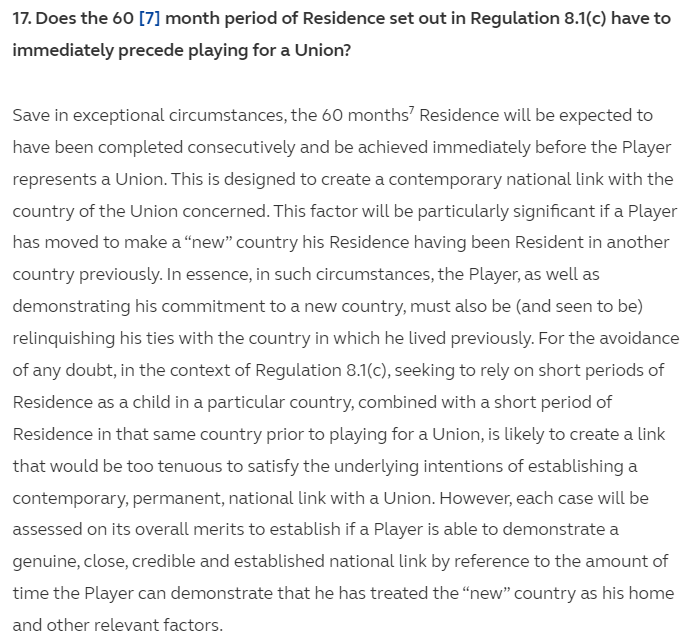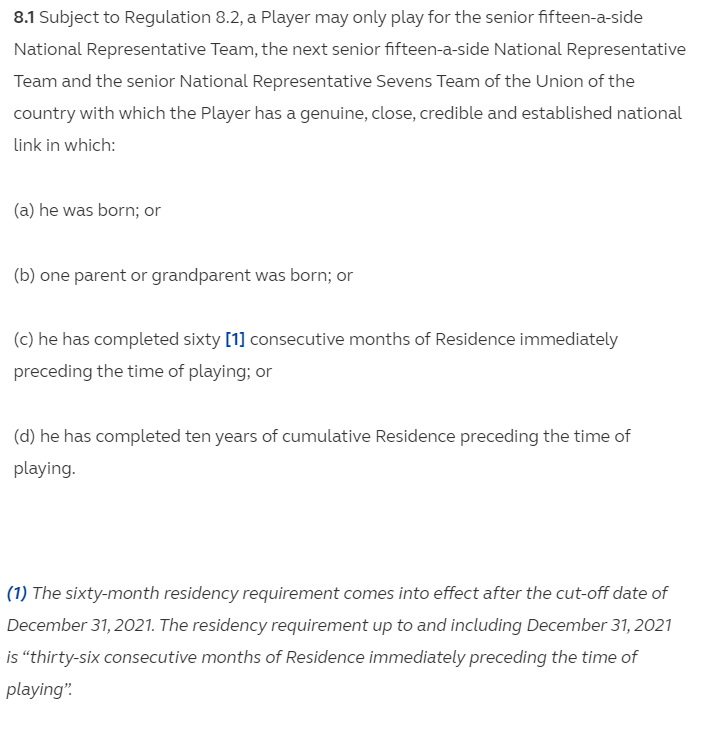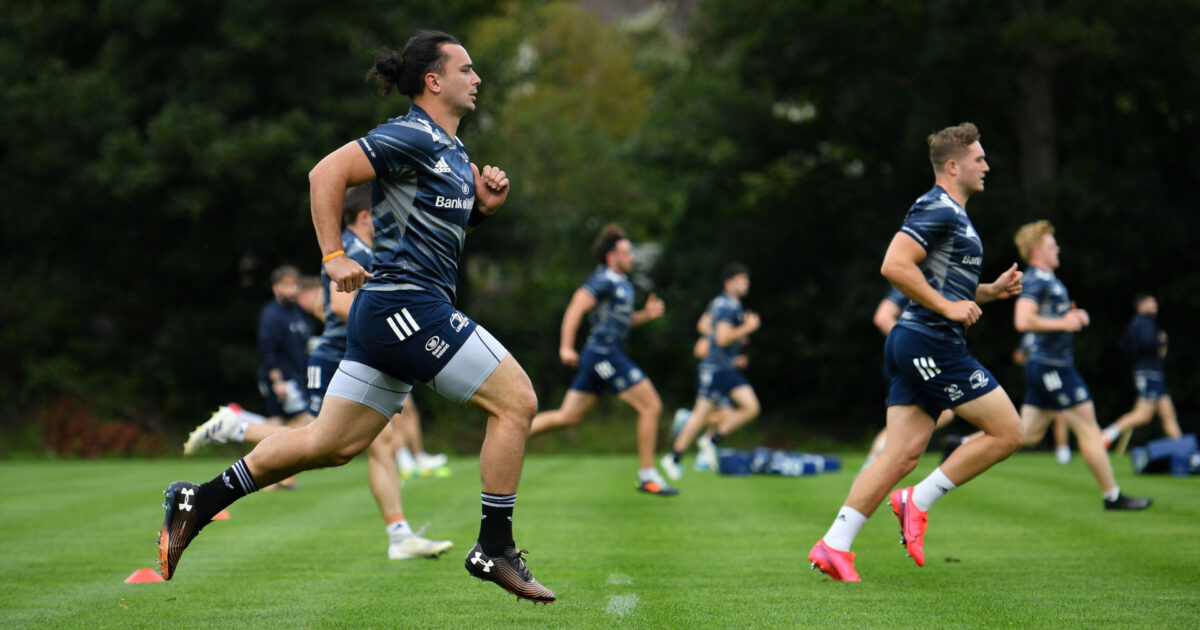World Rugby Change Eligibigilty Rules
-
@mariner4life said in World Rugby Change Eligibigilty Rules:
I have a bridge to sell you
Paging Eddie Jones...
-
@junior said in World Rugby Change Eligibigilty Rules:
@nta said in World Rugby Change Eligibigilty Rules:
@junior said in World Rugby Change Eligibigilty Rules:
@crucial said in World Rugby Change Eligibigilty Rules:
@crazy-horse said in World Rugby Change Eligibigilty Rules:
I think stretching it out to a grandparent is too far.
In western terms I generally agree (as in 'my granny was born in Scotland and moved to NZ as a child), but in the PI diaspora I think it is fair enough. The country ties are very strong.
I would also suggest that the ties are strong for the NZ diaspora in Oz, mainly due to proximity.
And the fact every fucking Kiwi at your club will swear on a Bible they were an AB trialist


To be fair, as soon as Google became a thing, we had a lot less AB trialists turning out at our club...
Lol club I was involved with in Brisbane, had a young fella come to play had been a NZ colt he told us, I asked him what Cowboy Shaw was like as a coach, his answer was who? I said Mark Shaw who coached the Colts last year. Anyway he never came back to club.
Mind you even in old days in NZ was known for the odd joker to claim he had a trial, but was in the days when they had 6 trial matches 2 on a wednesday and 1 on the weekend, and some would say hell I got as far as Wednesday trial teams, noone could remember who the hell was in those teams. -
A little background about the Fakatava situation.
-
makes me worry a bit if we're that worried about halfback we're asking for rules to be changed
-
But, anyway.
Fakatava was never going to meet the original 3 year deadline (May 2020) before the 5 year rule came in. WR extended that time as those who were just going to qualify in time - missed it due to covid cancellations in 2020 (the Pierre Schoeman / James Lowe loophole). A morally mariginal decision anyway, IMO. Marginal? No, down right morally bankrupt.
So Fakatava was about to unexpectedly benefit from a WR decision and get his qualification a year earlier than anyone had ever planned for.
When Fakatava set out on this path, he never expected to qualify by this time, unlike others who had their plans disrupted. There is therefore no basis to make an exception for him.
I can understand his players' union boss trying to push his case, that's their job. I hope it is chucked out though.
-
@rapido said in World Rugby Change Eligibigilty Rules:
He could 'fix' it by playing for Tonga.
so much this
-
@kiwiwomble said in World Rugby Change Eligibigilty Rules:
makes me worry a bit if we're that worried about halfback we're asking for rules to be changed
It's a stupid, illogical rule. It doesn't make sense at all.
The rule is that a player has completed 36/sixty consecutive months of residence immediately preceding the time of playing.
This is the reason for the rule:

The consideration should be whether a player - after meeting the residency requirement - has (or has not) stopped or interrupted his residence in his new country; whether he has still relinquished his ties with his previous country of residence, or has re-established them by going back for longer periods than permitted for short visits.Tell me, how does someone like Fakatava suddenly stop having a "contemporary, permanent, national link with" New Zealand by getting injured? He hasn't been back in Tonga after meeting the residency requirement. He has maintained his contemporary national link with NZ.
-
@stargazer calm
I'm not actually arguing that the rule is good or anything...im saying i very much doubt theyre suggesting the rules should be changed for any reason other than we feel we need it, not some altruistic reason, so im commenting on how worrying our depth at 9 is
-
@rapido said in World Rugby Change Eligibigilty Rules:
But, anyway.
Fakatava was never going to meet the original 3 year deadline (May 2020) before the 5 year rule came in.
Not sure where you get the May 2020 deadline from. He was born on 16 December 1999, so turned 18 on 16 December 2017 (just after he left school) and met the 36 months residency period on 16 December 2020. So before the original date that the new 60 month residency rule would have taken effect (1 January 2021).
-
@kiwiwomble I wasn't implying that you think the rule is good. I'm just pointing out that they should change the rule because it's stupid (so not specifically for Fakatava, but for anybody in his position. Before they moved the date to 1 January 2022, it affected - for example - Willis Halaholo, who would have played for Wales in 2020, if he hadn't been injured, just after completing the 36 months period and before the original date of 1 January 2021.)
-
@stargazer all good, read it like you were asking my to defend it, which i cant
-
@stargazer said in World Rugby Change Eligibigilty Rules:
@kiwiwomble said in World Rugby Change Eligibigilty Rules:
makes me worry a bit if we're that worried about halfback we're asking for rules to be changed
It's a stupid, illogical rule. It doesn't make sense at all.
The rule is that a player has completed 36/sixty consecutive months of residence immediately preceding the time of playing.
This is the reason for the rule:

The consideration should be whether a player - after meeting the residency requirement - has (or has not) stopped or interrupted his residence in his new country; whether he has still relinquished his ties with his previous country of residence, or has re-established them by going back for longer periods than permitted for short visits.Tell me, how does someone like Fakatava suddenly stop having a "contemporary, permanent, national link with" New Zealand by getting injured? He hasn't been back in Tonga after meeting the residency requirement. He has maintained his contemporary national link with NZ.
I agree it is stupid. It is stupid that they made this stupid concession to Scotland & Ireland and therefore Lowe and Schoeman should be stripped of eligibilty until the same date as Fakatava. (and any others who benefitted from WR caving into SRU and IRFU rather than being the impartial layer off the land that they are supposed to be)
But, not the other way around IMO.
-
@rapido We clearly disagree about what is stupid in this situation. You seem to agree with the rule, but disagree with the decision to delay the new 60-day period taking effect.
I disagree with the rule itself, where it requires the player to complete the residency period immediately before playing.
-
@stargazer said in World Rugby Change Eligibigilty Rules:
@rapido said in World Rugby Change Eligibigilty Rules:
But, anyway.
Fakatava was never going to meet the original 3 year deadline (May 2020) before the 5 year rule came in.
Not sure where you get the May 2020 deadline from. He was born on 16 December 1999, so turned 18 on 16 December 2017 (just after he left school) and met the 36 months residency period on 16 December 2020. So before the original date that the new 60 month residency rule would have taken effect (1 January 2021).
The 3 year to 5 year change was to occur May 2020.
The original cut off of the three year residency period – the date a player had to have been in residence in the said country from – was effectively May 2017, meaning players would have need to be capped by that date in May 2020.
However, World Rugby have been forced to delay the cut off as the coronavirus pandemic, and resulting disruption to rugby seasons, has meant many players will not have had opportunities to be capped. The governing body have now decided to extend that cut-off until the end of 2021, which means players who signed in 2018 can now qualify in 2021 rather than two years later 2023.
Fakatava wasn't going to meet the 3 year mark until 6 months after it was supposed to change to 5 years.
-
@stargazer said in World Rugby Change Eligibigilty Rules:
@rapido No. The original date for the 60-month residency requirement to take effect was 1 January 2021. That's now 1 January 2022.
Yes. You are right. But .... That date I have taken from here (But, I am still trying to work out the significance of what "players signed after May 2017 but prior to December 31st, 2018" and "effectively" actually means.
The original cut off of the three year residency period – the date a player had to have been in residence in the said country from – was effectively May 2017, meaning players would have need to be capped by that date in May 2020.
However, World Rugby have been forced to delay the cut off as the coronavirus pandemic, and resulting disruption to rugby seasons, has meant many players will not have had opportunities to be capped. The governing body have now decided to extend that cut-off until the end of 2021, which means players who signed in 2018 can now qualify in 2021 rather than two years later 2023.
It means players signed after May 2017 but prior to December 31st, 2018 to clubs in their respective territories could be captured if they get capped prior to the new cut off date at the end of 2021. That has defacto opened the door to the unions looking at uncapped foreign players heretofore not considered to be project players, who have been plying their trade in their territories, to be capped.
-
Changes to rules around eligibility should not retrospectively capture players.
-
@rapido Maybe the author of that article has confused two changes to the eligibilty rules that were made in 2017? Apart from extending the required 36 consecutive months of residency to 60 consecutive months, they also added a new residency rule about "cumulative residency", which was effective from 10 May 2017.
The reformed Regulation 8 ensures that a player has a genuine, close, credible and established link with the nation of representation, and the key amendments are:
-
The 36-month residency requirement is increased to 60 months with effect from 31 December, 2020 (unanimously approved)
-
The addition of a residency criteria which permits players who have 10 years of cumulative residency to be eligible (effective May 10, 2017) (unanimously approved)
etc
-

